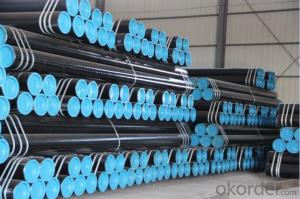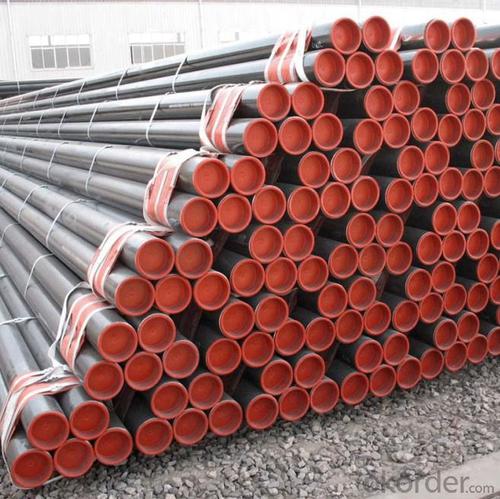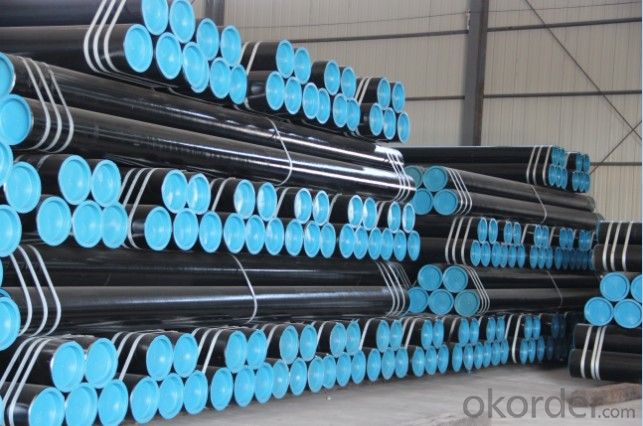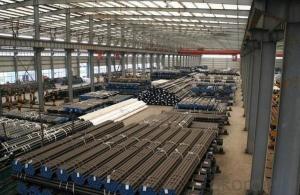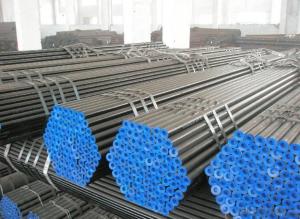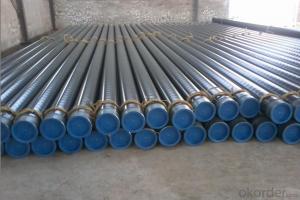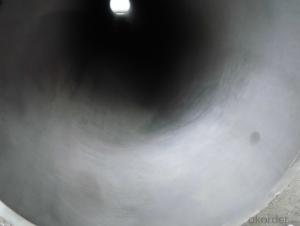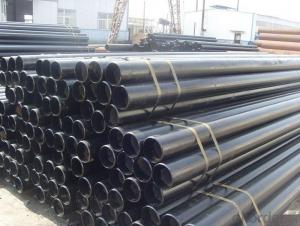Seamless steel pipe API,GB,ASTM,ASME,DIN
- Loading Port:
- Tianjin
- Payment Terms:
- TT OR LC
- Min Order Qty:
- 10 m.t.
- Supply Capability:
- 5000 m.t./month
OKorder Service Pledge
OKorder Financial Service
You Might Also Like
1. Commodity Name: Seamless steel pipe
2. Standard: API,GB,ASTM,ASME,DIN
3. Quality grade: 10#, 20#, A106B, A53B, API 5L B, Q235, Q345, ST37-2, ST 45, ST52.etc.
4. Dimension:
OD: 1/2"-24"
WT: 2.5-80mm, SCH10~SCH40~XXL
length: 5.8m,6m,8m,9m,12m
5. Technique: Hot Rolled/Cold Rolled/ Cold Drawn
6. application
carbon seamless steel pipes are widely used in gas, water and oil, transpotation;constructions;Bridge,highway,windows of model steel door; building materials;fences;heating facilities Fluid Pipe;conduit pipe,scaffolding pipe.etc.
7. Payment Terms: L/C D/A D/P T/T
8.packing and shipment
Packaged in bundles,as per customers' requirements, it can also bepackagesd as beveled ends, typed marking, black painting, plastic caps protection,woven bags packing
For 20" container the max length is 5.8m; For 40" container the max length is 12m. other options are available based on customer requests. Please discuss when placing orders.
9. Surface: painted with varnish;
10. Plastic caps at ends.
11. Tolerance: OD +1%/-1%
WT +12.5%/-10%
12. Chemical composition:
Models of Steel Pipes | Chemical Component | |||||||
Steel 20 (ASTM A106B) | C | Si | Mn | P | S | Cu | Ni | Cr |
0.17~0.24 | 0.17~0.37 | 0.35~0.65 | 0.035max | 0.035max | 0.25max | 0.25max | 0.25max | |
Steel45 (ASTM 1045) | 0.42~0.50 | 0.17~0.37 | 0.50~0.80 | 0.035max | 0.035max | 0.25max | 0.25max | 0.25max |
16Mn(Q345B) | 0.12~0.20 | 0.20~0.55 | 1.20~1.60 | 0.035max | 0.035max | 0.25max | 0.25max | 0.25max |
45Mn2 ( ASTM1345) | 0.42~0.49 | 0.17~0.37 | 1.40~1.80 | 0.035max | 0.035max | 0.3max | 0.3max | 0.30max |
- Q: Can steel pipes be used for sewer systems?
- Yes, steel pipes can be used for sewer systems. However, they are less commonly used compared to other materials such as PVC or concrete pipes. Steel pipes are generally used for larger diameter sewer lines or in specific situations where they are preferred due to their strength and durability.
- Q: Material of welded steel pipe
- GB/T3092-1993 (galvanized steel pipe for low pressure fluid delivery). Mainly used to transport water, gas, air, oil and heating, hot water or steam, etc. generally lower pressure fluid and other use tube. Its representative material is: Q235 grade a steel.GB/T14291-1992 (mine fluid conveying welded steel pipe). It is mainly used in mine pressure air, drainage and vertical seam gas welding pipe. Its representative material is Q235A, B grade steel.
- Q: How do steel pipes handle thermal expansion and contraction?
- The unique properties and design of steel pipes enable them to handle thermal expansion and contraction. When exposed to high temperatures, steel pipes expand as the molecules in the material gain energy and become more active. Conversely, when exposed to low temperatures, steel pipes contract as the molecules lose energy and become less active. To accommodate these changes, steel pipes are manufactured with specific features. One such feature is the inclusion of clearance between pipe joints. This clearance allows for expansion and contraction without causing stress or deformation in the pipe. Additionally, expansion joints or flexible connectors are used within the piping system to absorb thermal movements and prevent damage. Moreover, steel pipes are commonly installed with appropriate anchoring and support systems. These systems are designed to allow the pipes to expand and contract within a certain range without exerting excessive stress or strain on the structure or surrounding components. Anchoring and support systems also help maintain the overall stability and integrity of the piping system. In certain cases, thermal insulation materials are applied to steel pipes to minimize temperature changes and mitigate the effects of expansion and contraction. These insulating materials assist in maintaining a consistent temperature within the pipe, thereby reducing the magnitude of thermal movements. Overall, due to their inherent strength and flexibility, steel pipes are well-equipped to handle thermal expansion and contraction. With proper design, installation, and maintenance, steel pipes can effectively accommodate temperature changes without compromising their structural integrity or functionality.
- Q: How are steel pipes used in the construction of geothermal power plants?
- Steel pipes are used in geothermal power plants for various purposes, including the transport of geothermal fluids from the underground reservoir to the surface, the distribution of these fluids within the plant, and the construction of the plant's infrastructure, such as the well casing and steam piping.
- Q: How are steel pipes used in water treatment plants?
- Steel pipes are commonly used in water treatment plants to transport and distribute water throughout the facility. They are used for various purposes such as conveying raw water from the source to the treatment plant, transporting treated water to storage tanks or distribution points, and carrying chemicals or additives used in the treatment process. Steel pipes are preferred due to their durability, strength, and resistance to corrosion, ensuring the safe and efficient flow of water within the plant.
- Q: What are the different types of coatings used for steel pipes?
- There are several types of coatings used for steel pipes, including epoxy coatings, polyethylene coatings, fusion bonded epoxy coatings, and zinc coatings. Each type of coating offers different benefits and is used for specific applications to protect the steel pipes from corrosion and improve their durability.
- Q: Can steel pipes be used for underground fuel storage tanks?
- Yes, steel pipes can be used for underground fuel storage tanks. Steel pipes are commonly used for underground fuel storage tanks due to their durability, strength, and resistance to corrosion. They can effectively contain and protect fuel while being buried underground.
- Q: Can steel pipes be used for conveying abrasive slurries?
- Indeed, abrasive slurries can be effectively conveyed through steel pipes. The remarkable durability and strength of steel pipes render them highly suitable for the transportation of abrasive substances like slurries. Nevertheless, to guarantee prolonged service life and avert excessive deterioration, it is crucial to carefully choose the right grade of steel and take into account factors such as pipe thickness, lining choices, and flow velocity. Furthermore, the implementation of adequate maintenance and inspection protocols can play a pivotal role in promptly identifying and resolving any wear or corrosion issues that may arise with time.
- Q: What is the difference between API 5L and ASTM A106 steel pipes?
- API 5L and ASTM A106 steel pipes are both widely used in the oil and gas industry, but they have some key differences. API 5L is a specification for seamless and welded steel pipes used for pipeline transportation systems in the petroleum and natural gas industries. It covers various grades of carbon and alloy steel pipes, with different strength levels and impact requirements. API 5L pipes are designed for conveying fluids, such as oil, gas, and water, over long distances. On the other hand, ASTM A106 is a specification for seamless carbon steel pipes used for high-temperature service. It covers seamless pipes for pressure and mechanical applications, including transportation of fluids and gases in industries like refineries, power plants, and boilers. While both API 5L and ASTM A106 pipes are used in similar applications, the main difference lies in their intended use and the specific requirements they must meet. API 5L pipes are primarily used for pipeline transportation systems, whereas ASTM A106 pipes are more focused on high-temperature service applications. Additionally, the manufacturing processes and testing requirements for both specifications may vary.
- Q: There are multiple welded galvanized steel pipe outer diameter 108mm wall thickness 4mm length of 6 meters
- Galvanized steel pipe wall thickness weight outer diameter 108mm 4mm 6 meters in length is about 10.26*6*1.06=65 kg.Kg/m= (outside diameter mm-, wall thickness mm) * wall thickness mm*0.02466= (108-4) *4*0.02466=10.26 kg / MBecause of galvanizing, the weight is heavier than that of ordinary welded pipe 3%~6%.
Send your message to us
Seamless steel pipe API,GB,ASTM,ASME,DIN
- Loading Port:
- Tianjin
- Payment Terms:
- TT OR LC
- Min Order Qty:
- 10 m.t.
- Supply Capability:
- 5000 m.t./month
OKorder Service Pledge
OKorder Financial Service
Similar products
Hot products
Hot Searches
Related keywords

